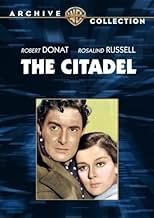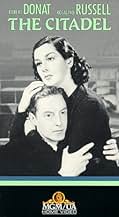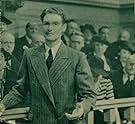PUNTUACIÓN EN IMDb
7,0/10
2,5 mil
TU PUNTUACIÓN
Un joven y entusiasta médico se embarca alegremente en su carrera, pero no tarda en descubrir lo que realmente implica ser médico.Un joven y entusiasta médico se embarca alegremente en su carrera, pero no tarda en descubrir lo que realmente implica ser médico.Un joven y entusiasta médico se embarca alegremente en su carrera, pero no tarda en descubrir lo que realmente implica ser médico.
- Dirección
- Guión
- Reparto principal
- Nominado para 4 premios Óscar
- 9 premios y 4 nominaciones en total
Penelope Dudley-Ward
- Toppy LeRoy
- (as Penelope Dudley Ward)
Francis L. Sullivan
- Ben Chenkin
- (as Francis Sullivan)
Reseñas destacadas
This is a wonderful film that deserves to be seen by a wider audience than it currently receives. The screenplay of "The Citadel" is excellent and deals with issues that have a continuing relevance today. Indeed, its theme--the importance of having a strong sense of vocation and integrity --especially among medical doctors, will probably always retain its original significance.
Robert Donat plays a physician who starts out as an idealistic young man working in a poor Welsh coal mining district, but after a series of disappointments he leaves and becomes a cynical member of a London clinic for rich patients, practising the kind of assembly line medicine that is all too common today in many countries. It is likely, however, that the film had a definite influence in countries like the United Kingdom and Canada, which developed publicly-funded medical plans after World War Two.
But even the best universal health care systems can still be prone to such problems as inequities in the availability or quality of treatment and incompetent or uncaring doctors, interested only in making money. Moreover, the issues of professional ethics, individual conscience and personal commitment are applicable to many other occupations, as we've recently seen in the cases of corrupt corporations, such as Enron, which have also abused people's trust.
The other main virtue of this film lies in the acting of Robert Donat. Sir Laurence Olivier once stated that Robert Donat would have been a greater actor than Olivier himself was, had it not been for the chronic asthma that plagued Donat throughout his life and ultimately killed him. That terrible respiratory illness may have inspired him, in "The Citadel," to give one of the most sensitive and moving performances I have ever seen on film, during the scene in which Dr. Manson gets a baby, thought to have died, to breath again.
Donat's complete mastery of what the legendary Konstantin Stanislavsky called "tempo-rhythmn" gives a palpable urgency to this scene that is unforgettable. Watch his delicate and expressive use of his hands while he works to save the infant he's holding. These are the hands of a great actor giving life to a scene, and, at the same time, the hands of a great doctor giving life to a child.
This is acting of the highest order, and if you want to see what the real "Stanislavsky Method" (and not the inferior misinterpretation of it by Lee Strasberg) was all about, Donat's performance in this scene remains as magnificent a demonstration of its goal of emotional truth as I have ever witnessed in many years of watching theatre and film. The rest of his performance is equally brilliant. The changes in his face perfectly convey the degrees by which the former idealist becomes a jaded opportunist, and then. . .
Well, I don't want to be a spoiler and give the whole story away! I highly recommend "The Citadel" to anyone who enjoys films that have real meaning, or who appreciates the true, and truthful, art of acting--acting that is so brilliant and free from any trace of mannerism and artifice that we forget we're watching acting at all. We're seeing life and art unfold together. Thanks to the talent of Robert Donat, form and content become one: his concern with integrity and the film's concern with it simply merge into an inseparable artistic unity. This is a cinematic experience that nobody should miss.
Robert Donat plays a physician who starts out as an idealistic young man working in a poor Welsh coal mining district, but after a series of disappointments he leaves and becomes a cynical member of a London clinic for rich patients, practising the kind of assembly line medicine that is all too common today in many countries. It is likely, however, that the film had a definite influence in countries like the United Kingdom and Canada, which developed publicly-funded medical plans after World War Two.
But even the best universal health care systems can still be prone to such problems as inequities in the availability or quality of treatment and incompetent or uncaring doctors, interested only in making money. Moreover, the issues of professional ethics, individual conscience and personal commitment are applicable to many other occupations, as we've recently seen in the cases of corrupt corporations, such as Enron, which have also abused people's trust.
The other main virtue of this film lies in the acting of Robert Donat. Sir Laurence Olivier once stated that Robert Donat would have been a greater actor than Olivier himself was, had it not been for the chronic asthma that plagued Donat throughout his life and ultimately killed him. That terrible respiratory illness may have inspired him, in "The Citadel," to give one of the most sensitive and moving performances I have ever seen on film, during the scene in which Dr. Manson gets a baby, thought to have died, to breath again.
Donat's complete mastery of what the legendary Konstantin Stanislavsky called "tempo-rhythmn" gives a palpable urgency to this scene that is unforgettable. Watch his delicate and expressive use of his hands while he works to save the infant he's holding. These are the hands of a great actor giving life to a scene, and, at the same time, the hands of a great doctor giving life to a child.
This is acting of the highest order, and if you want to see what the real "Stanislavsky Method" (and not the inferior misinterpretation of it by Lee Strasberg) was all about, Donat's performance in this scene remains as magnificent a demonstration of its goal of emotional truth as I have ever witnessed in many years of watching theatre and film. The rest of his performance is equally brilliant. The changes in his face perfectly convey the degrees by which the former idealist becomes a jaded opportunist, and then. . .
Well, I don't want to be a spoiler and give the whole story away! I highly recommend "The Citadel" to anyone who enjoys films that have real meaning, or who appreciates the true, and truthful, art of acting--acting that is so brilliant and free from any trace of mannerism and artifice that we forget we're watching acting at all. We're seeing life and art unfold together. Thanks to the talent of Robert Donat, form and content become one: his concern with integrity and the film's concern with it simply merge into an inseparable artistic unity. This is a cinematic experience that nobody should miss.
This film features an excellent cast, ably led by Robert Donat in a performance that is superior to his marvelous performance one year later in Goodbye, Mr. Chips. As a young doctor, he begins with the highest intentions, gradually becoming cynical and disillusioned. He decides it's better to have money than scruples, with predictable results. Outstanding work as well by Rex Harrison and Rosiland Russell and a very good script. Most recommended.
A.J. Cronin's book "The Citadel" was adapted for a 1938 film starring Robert Donat, Rosalind Russell, Ralph Richardson, Rex Harrison, and Emlyn Williams, directed by King Vidor.
Donat plays Andrew, a young, idealistic new doctor who goes to work in a small Welsh mining town, where he marries a pretty schoolteacher, Christine (Rosalind Russell). Many of the miners have a persistent cough, and he becomes interested in finding the cause. But the miners have little understanding of the big picture and just want the "pink medicine" the old doctor gave them, which just helped their symptoms.
Thwarted at every turn, Andrew and Christine move to London, where Andrew opens a practice. Then he has a change of fortune when he runs into an old friend (Rex Harrison) who gets him on the society doctor track, where he gets big money for treating hypochondriacal patients and by merely being present while a surgery is being performed, or taking a referral.
A beautiful movie with the underrated Donat turning in a wonderful performance of quiet intensity. Russell's expressions say more than her words - you know exactly how she's feeling. Ralph Richardson -- was he ever bad? - plays Andrew's old friend Denny, who notices the change in Andrew's goals.
A.J. Cronin was one of the authors whose novels were often adapted for film in the old days: "The Spanish Gardener," "The Green Years,", "Keys of the Kingdom," "Bright Victory," "Vigil in the Night," and others. Some of his stories involve medicine/science and sacrifice/dedication. Those books made for some inspiring films in the '30s and '40s.
Donat plays Andrew, a young, idealistic new doctor who goes to work in a small Welsh mining town, where he marries a pretty schoolteacher, Christine (Rosalind Russell). Many of the miners have a persistent cough, and he becomes interested in finding the cause. But the miners have little understanding of the big picture and just want the "pink medicine" the old doctor gave them, which just helped their symptoms.
Thwarted at every turn, Andrew and Christine move to London, where Andrew opens a practice. Then he has a change of fortune when he runs into an old friend (Rex Harrison) who gets him on the society doctor track, where he gets big money for treating hypochondriacal patients and by merely being present while a surgery is being performed, or taking a referral.
A beautiful movie with the underrated Donat turning in a wonderful performance of quiet intensity. Russell's expressions say more than her words - you know exactly how she's feeling. Ralph Richardson -- was he ever bad? - plays Andrew's old friend Denny, who notices the change in Andrew's goals.
A.J. Cronin was one of the authors whose novels were often adapted for film in the old days: "The Spanish Gardener," "The Green Years,", "Keys of the Kingdom," "Bright Victory," "Vigil in the Night," and others. Some of his stories involve medicine/science and sacrifice/dedication. Those books made for some inspiring films in the '30s and '40s.
I found the performances of Donat and Russel fascinating so many years after the film was made. A J Cronyn's story is relevant even today and that makes the film entertaining. King Vidor needs to be complimented on getting such wonderful performances out of the leading pair as well as Rex Harrison and Ralph Richardson. Mary Clare as Mrs Orlando was also an interesting though brief performance. Harry Stradling's camerawork is impressive, if taken in perspective of the film's vintage.
What is a shame is that Rosalind Russel was not picked up by good directors for meaty serious roles, after this noteworthy performance.
What is a shame is that Rosalind Russel was not picked up by good directors for meaty serious roles, after this noteworthy performance.
10madshell
A morality tale of medicine, this film brilliantly illustrates the plight of a doctor who truly cares for healing the sick -- yet even finds his patients to be dishonest. Robert Donat is superb in his transformation from a good doctor to a money making doctor for the rich. Roselyn Russell compliments his performance with her own emotional struggle, as she watches her husband all but lose his heart. Brilliant direction from early veteran director King Vidor gives this film a worthy place in film history. This is a must see for any doctor -- IMHO.
¿Sabías que...?
- PifiasWhen Andrew examines Christine's throat, he sits in front of a light that is supposedly reflected into Christine's mouth by his eyepiece. We see this from over Andrew's shoulder, and when the light is directed into her mouth, it is clearly coming from behind Andrew, because the back of his eyepiece is illuminated.
- Citas
Christine Barlow Manson: Andrew, Do you remember once telling me that a all good research man needed was a notebook, a microscope and a room with a roof over it?
- Créditos adicionalesPrologue: "This motion picture is a story of individual characterizations and is in no way intended as a reflection on the great medical profession which has done so much towards beating back those forces of nature that retard the physical progress of the human race."
- Versiones alternativasAlso shown in computer colorized version.
- ConexionesFeatured in The Ultimate Film (2004)
Selecciones populares
Inicia sesión para calificar y añadir a tu lista para recibir recomendaciones personalizadas
- How long is The Citadel?Con tecnología de Alexa
Detalles
- Fecha de lanzamiento
- País de origen
- Idioma
- Títulos en diferentes países
- The Citadel
- Localizaciones del rodaje
- Abertillery, Blaenau Gwent, Gales, Reino Unido(Village scenes)
- Empresa productora
- Ver más compañías en los créditos en IMDbPro
- Duración1 hora 50 minutos
- Color
- Relación de aspecto
- 1.37 : 1
Contribuir a esta página
Sugerir un cambio o añadir el contenido que falta


























